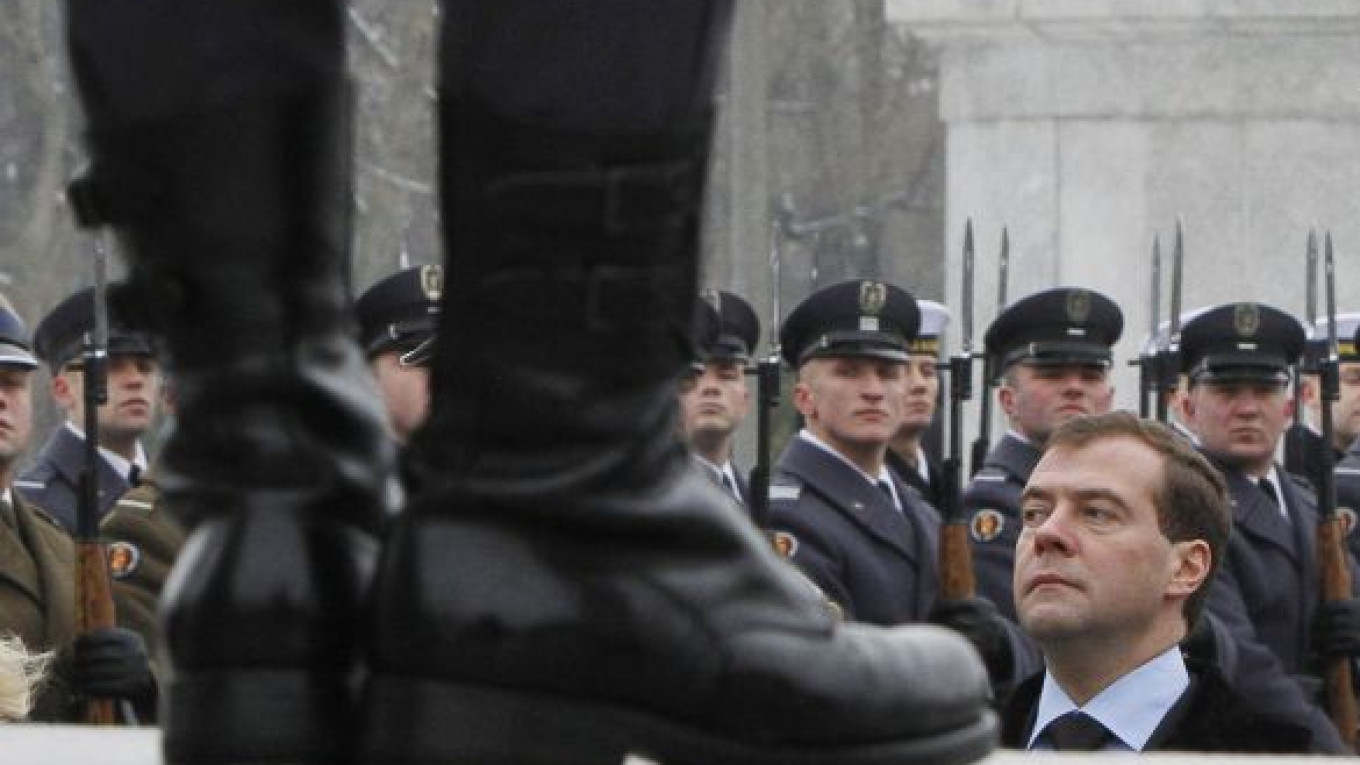BRUSSELS — Russia will demand that NATO drop its secret agreement to defend three Baltic states against any military attack, Dmitry Rogozin, Russia's envoy to the alliance, said Tuesday.
According to confidential U.S. cables released by WikiLeaks, NATO privately decided in January to expand a defense plan for Poland to also cover NATO members Estonia, Latvia and Lithuania.
The release of the cables is an embarrassment for both Russia and the alliance because it comes at a time of reconciliation between the former Cold War rivals, when both sides have been emphasizing how close their relations have become.
Rogozin said he would bring up the NATO agreement to defend the Baltic states during Wednesday's meeting of the NATO-Russia Council.
"We must get some assurances that such plans will be dropped, and that Russia is not an enemy for NATO," he said. "I expect my colleagues from the NATO-Russia Council to confirm that Lisbon has made all the difference."
Rogozin said that despite official denials by NATO officials, the plan was clearly aimed at his country. "Against whom else could such a defense be intended? Against Sweden, Finland, Greenland, Iceland, against polar bears, or against the Russian bear?" he said.
NATO's core obligation is to defend all its member states, but the alliance had initially not prepared detailed military plans for the defense of Estonia, Latvia and Lithuania since they joined in 2004. But after Russia's quick victory in the 2008 war with Georgia, the three nations began pressing for a greater U.S. and NATO presence.
In a January-dated cable posted on the WikiLeaks web site, the U.S. State Department told its embassies to keep the NATO plan secret because "a public discussion of contingency planning would also likely lead to an unnecessary increase in NATO-Russia tensions."
President Dmitry Medvedev, speaking after a summit Tuesday with EU leaders in Brussels, avoided the controversy over NATO's Baltic defense plans. He only noted that the atmosphere at a NATO-Russia summit in Lisbon last month was very friendly, adding that "we need to preserve that spirit."
Still, the cables indicated that some nations remained wary of Moscow's intentions. In another cable to the U.S. State Department last December, Paul Teesalu, security director in the Estonian Foreign Ministry, described the NATO defense plan as an "early Christmas present." He said such discussions should be conducted out of the public eye, saying that Estonia is looking for "solidarity, not visibility."
The plan, code-named Eagle Guardian, has a number of NATO units agreeing to defend Poland and the Baltics in case of attack. It also identifies ports in Poland and Germany that alliance naval forces would use in case of war.
In a third cable from a year ago, Ivo Daalder, the U.S. ambassador to NATO, said Germany had initiated the proposal to include the Baltic states in Eagle Guardian.
NATO spokesperson Oana Lungescu declined on Tuesday to comment on the contents of the WikiLeaks memos. "But NATO has always had and will continue to have appropriate plans to protect all allies. This is at the core of our collective defense task," Lungescu said.
Germany's foreign and defense ministries also declined to comment.
Poland has asked the United States for more protection against Russia, saying it wanted "North American boots" on its land, Reuters reported, citing U.S. diplomatic cables obtained by WikiLeaks and published in a Spanish newspaper.
Spain's El Pais newspaper said Polish Defense Minister Bogdan Klich had told U.S. diplomats that U.S. forces could use three military complexes on its territory, the leaks revealed.
"We want North American boots on the land," Polish government aide Witold Waszczykowski was quoted in the cables.
Polish officials said Russia was the greatest threat for Poland, not Iran, according to the documents.
A Message from The Moscow Times:
Dear readers,
We are facing unprecedented challenges. Russia's Prosecutor General's Office has designated The Moscow Times as an "undesirable" organization, criminalizing our work and putting our staff at risk of prosecution. This follows our earlier unjust labeling as a "foreign agent."
These actions are direct attempts to silence independent journalism in Russia. The authorities claim our work "discredits the decisions of the Russian leadership." We see things differently: we strive to provide accurate, unbiased reporting on Russia.
We, the journalists of The Moscow Times, refuse to be silenced. But to continue our work, we need your help.
Your support, no matter how small, makes a world of difference. If you can, please support us monthly starting from just $2. It's quick to set up, and every contribution makes a significant impact.
By supporting The Moscow Times, you're defending open, independent journalism in the face of repression. Thank you for standing with us.
Remind me later.


